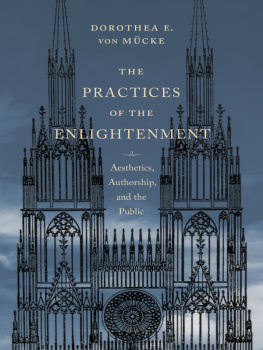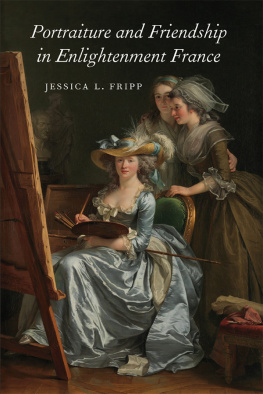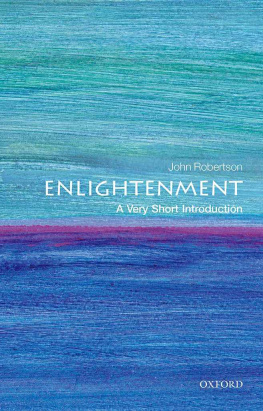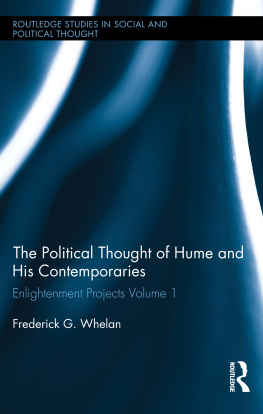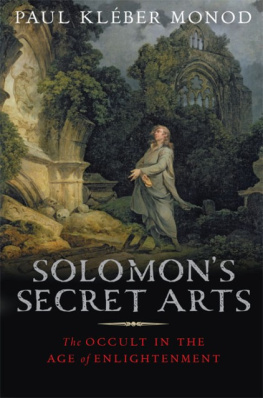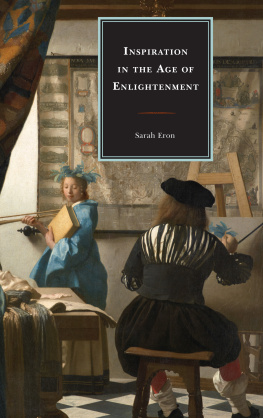THE
PRACTICES
OF THE
ENLIGHTENMENT
COLUMBIA THEMES IN PHILOSOPHY,
SOCIAL CRITICISM, AND THE ARTS
COLUMBIA THEMES IN PHILOSOPHY,
SOCIAL CRITICISM, AND THE ARTS
Lydia Goehr and Gregg M. Horowitz, editors
ADVISORY BOARD
| Carolyn Abbate | J. M. Bernstein |
| Eve Blau | T.J. Clark |
| Arthur C. Danto | John Hyman |
| Michael Kelly | Paul Kottman |
Columbia Themes in Philosophy, Social Criticism, and the Arts presents monographs, essay collections, and short books on philosophy and aesthetic theory. It aims to publish books that show the ability of the arts to stimulate critical reflection on modern and contemporary social, political, and cultural life. Art is not now, if it ever was, a realm of human activity independent of the complex realities of social organization and change, political authority and antagonism, cultural domination and resistance. The possibilities of critical thought embedded in the arts are most fruitfully expressed when addressed to readers across the various fields of social and humanistic inquiry. The idea of philosophy in the series title ought to be understood, therefore, to embrace forms of discussion that begin where mere academic expertise exhausts itself, where the rules of social, political, and cultural practice are both affirmed and challenged, and where new thinking takes place. The series does not privilege any particular art, nor does it ask for the arts to be mutually isolated. The series encourages writing from the many fields of thoughtful and critical inquiry.
For a list of books, see
DOROTHEA E.
VON MCKE
THE
PRACTICES
OF THE
ENLIGHTENMENT
Aesthetics,
Authorship,
and the
Public
COLUMBIA UNIVERSITY PRESS
NEW YORK
Columbia University Press
Publishers Since 1893
New York Chichester, West Sussex
cup.columbia.edu
Copyright 2015 Columbia University Press
All rights reserved
E-ISBN 978-0-231-53933-3
Library of Congress Cataloging-in-Publication Data
Mcke, Dorothea E. von.
The practices of the Enlightenment : aesthetics, authorship, and the public/
Dorothea E. von Mcke.
pages cm (Columbia themes in philosophy, social criticism, and the arts)
Includes bibliographical references and index.
ISBN 978-0-231-17246-2 (cloth : alk. paper) ISBN 978-0-231-53933-3 (e-book)
1. Enlightenment. 2. Aesthetics. 3. Authorship. I. Title.
B802.M79 2015
190.9'033dc23
2014035520
A Columbia University Press E-book.
CUP would be pleased to hear about your reading experience with this e-book at .
COVER IMAGE
Attributed to Erwin von Steinbach. Sketch B of the Strasbourg Cathedral.
Reprinted from Marcel Aubert, The Art of the High Gothic Era, 1965.
COVER AND BOOK DESIGN
Lisa Hamm
References to Web sites (URLs) were accurate at the time of writing. Neither the author nor Columbia University Press is responsible for URLs that may have expired or changed since the manuscript was prepared.
FOR PHILIPPE AND MIRIAM
CONTENTS
I t was first in classroom, conference, and lecture settings that I started to explore some of the observations and ideas that ended up in this book. I am grateful to my students at Columbia University who took my classes Aesthetics and the Philosophy of History, Enlightenment and Religion, and Rousseau and Goethe for their lively and engaged participation. I thank Jrn Steigerwald and Rudolf Behrens for their hospitality in Bochum and Halle, Helmut Schneider and Eva Geulen for inviting me to Bonn, Christoph Holzhey for hosting me for an entire semester at the Institute for Cultural Inquiry, and Heidi Reiss Wellbery for offering me a home in Berlin. Luciana Villas Bas was a most wonderful hostess, allowing me to present and discuss various aspects of this book in Rio de Janeiro. Jonathan Sheehan, Niklas Largier, Reinhold Martin, Joanna Stalnaker, and Irina Paperno provided me with felicitous feedback at the right time. Earlier versions of some chapters of this book have appeared in article form. I thank the editors of New Literary History, Grey Room, Representations, and the Romanic Review for permission to use these materials.
For the past ten years Stefan Andriopoulos, Kelly Barry, and Caroline Bynum have been the most reliable and supportive friends and interlocutors. They have read many versions of many parts of this book and provided me with thorough and constructive criticism and insightful advice. I am deeply grateful to them. Without Bill Dellingers wit, patience, and superb administrative expertise, and without Peggy Quisenberrys kindness, I would not have been able to progress with my research while serving as chair of my department. I am very thankful to Brook Henkel and Sophie Alexander Salvo, who have given me much more than reliable research assistance. They shared their thoughts and they cared about the actual form of the book with great attention to detail.
I thank Lydia Goehr for graciously including my book in her series. It has been a pleasure to work with Wendy Lochner, Christine Dunbar, and Susan Pensak from Columbia University Press. I am thankful to the two anonymous readers who have carefully read and commented on the manuscript for the press, as I am also deeply grateful to David Bates, Paul Fleming, and Chris Cullens, who have taken the trouble to read the entire manuscript, to provide insightful comments, and to help me gain more distance and perspective toward it.
Finally, I would like to express my gratitude to my parents, Horst and Veronica von Mcke, my husband, Philippe Similon, and my daughter, Miriam von Mcke Similon, for their steady and loving support. Ten years ago, when I started this book, Miriam was a lively, bright child. Now she is no less spirited but in the meantime she has also become a serious intellectual and an astute critic. It is to Miriam and Philippe that I dedicate this book.
A esthetics, authorship and the public, the three foci of this book, were sites of serious concern and change during the Enlightenment: taste, rather than an acquired ability and a marker of social distinction, became a universal faculty evincing a distinctly human mode of experiencing pleasure. A rule-oriented poetics gave way to an emphasis on unprecedented innovation and creativity, and art became the exclusive domain of original genius. As the print market, especially of literature written in the vernacular, exponentially increased during the second half of the eighteenth century, not only the economic and legal situation of writers but also the relationship between writer and biographical persona underwent great transformations and showed a heightened awareness of a publications appeal to different kinds of audiences. Together with the birth of the celebrity author such as Rousseau or Goethe, the eighteenth century witnessed the emergence of the concept of an active, critical public.
The guiding thread of this study lies in the claim that the Enlightenmentif understood not just as a historical period but as a distinct ethoswas deeply committed to specific practices, such as those called for by the following maxims: Think for yourself! Put yourself in the position of everybody else! Think consistently! Whereas the call to emancipate oneself from the ingrained habit of relying on prejudice and authority from Immanuel Kants prize-winning essay is quite well known, it might seem surprising to find that Kant articulates these maxims in the context of discussing how we come to attribute universal validity to aesthetic judgments, which are, after all, based on a subjective feeling. Indeed, it is probably less commonly known how the claim of the universal validity of aesthetic judgmentsan utterly novel, radical departure from traditional discourses on art and aestheticsis related to the opposition to prejudice and authority and a trust in the human capacity for radical innovation and originality. This study will attempt to unfold those connections. I hope to show how a new concept of aesthetic experience and creativity crucially shapes concepts of authorship and I shall examine new ways of constructing audiences and publics.

